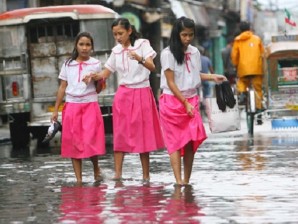MANILA, Philippines–Giving barangay chiefs the responsibility to suspend classes in the event of localized heavy rains and flooding would be a “more effective” policy to avoid confusion among students and parents, an education official said Tuesday.
Assistant Secretary Jesus Mateo said the policy, enforced after late class suspension announcements last week again caused public confusion recently, would be effective as village officials know their localities best.
“DepEd was consulted and, yes, it is more effective because the barangay captain knows what is happening at the ground level,” Mateo said when reached by phone on Tuesday.
The new protocol was earlier disseminated to school officials through DepEd Order No. 43 issued in May, which stipulated government’s new policy on class suspensions.
The order effected Executive Order No. 66, which laid down new mechanics on the suspension of classes: classes in pre-school and kindergarten are automatically suspended under Storm Signal No. 1, pre-school through high school in areas under Signal No. 2, and pre-school through college (including graduate school) in areas under Signal No. 3.
Local officials were meanwhile empowered to suspend classes in their jurisdiction in case heavy rains and dangerous flooding occur even without a storm signal.
The policy was first tested out last week, when heavy rains caused by a low pressure area triggered sudden flooding around Metro Manila and nearby provinces. Students and parents again complained of delayed announcements–supposedly the call of town and city mayors.
To fix the problem, Interior Secretary Jesse Robredo said this week that local government units further devolved the function to barangay captains, giving them the discretion to call off classes when the weather warrants.
But Kabataan party-list Rep. Raymond Palatino found the new policy a cop-out, saying the national government seemed to “evade responsibility” by passing on the job to local officials.
“Government is trying to deflect public anger by passing responsibility to barangays. Malacañang should lead interagency multi-stakeholder consultation on this issue. But what barangays should do is to lead typhoon, flood drills in schools,” Palatino said.
“The problem is inefficient information system. Policy should be national-local mix … Schools are barangay-based so it’s not necessary for barangay to duplicate what schools themselves can do like suspending classes,” he added.
Youth group Anakbayan echoed Palatino’s view and said the national government should remain responsible for deciding whether or not to suspend classes.
“They have more resources and capacity to get information and inform. It is the national government’s responsibility and mandate to ensure the safety and health of students. Why are they abandoning their task?” said Anakbayan chair Vencer Crisostomo.
